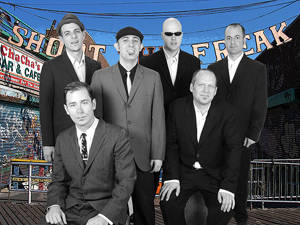“Music as Rebellion, the Italian American way”
What do Italian-Americans have in common with hardcore rock, punk and hip-hop music? In New York in the 1980s these musical genres thrived and provided a sense of belonging to urban youth, especially those who rejected the burgeoning Guido culture sparked by the 1970s film Saturday Night Fever, which idealized slick back hair and polyester suits and platform shoes. As a consequence, these images became the ‘uniform’ for many Italian American youths across America.
At the Calandra Institute last Friday and array of underground musicians and artists spoke about how being Italian American affected their upbringings, development of self-image, and artistic careers. Some participants included Vinnie Stigma from Agnostic Front, Kaves from The Lordz of Brooklyn, Martin Perna from TV on the Radio and Vic Ruggiero from The Slackers. Antonino D’Ambrosio, who recently wrote a book on the legendary Johnny Cash, moderated a panel discussion with some of these alternative artists, who illuminated quite a bit about growing up Italian American in 80s America.
In New York, where droves of Italian American kids searched for identities, there was a counter-culture, a reaction to—if not against—the popular Guido image of the late 70s and early 80s: Punk. Some kids just didn’t jive with the Travolta look, so they sought other self-images and musical styles to celebrate. They became “punks”, hip-hop singers and/or graffiti artists, creating sub-cultures that were not ashamed of the urban grit and struggle around them.
Punk was born in London in the mid-70s and made its way to New York by 1980, if not earlier. Bands like The Clash and The Sex Pistols inspired New York kids who went on to create bands such as The Ramones. Hip-hop was also taking off, with bands like Public Enemy, and in a time period when racial tensions were profound in neighborhoods like Bay Ridge (Brooklyn) and Howard Beach (Queens), it seemed like two teams were forming, and Italian American kids had to choose to go with the mainstream “Guidos” or with the “others” which could include punk, hardcore or hip-hop.
The idea that punk music was a reaction against Guido culture and the Regan era was apparent when listening to the panel discussions, who had experienced New York, and the Lower East Side in particular, at its roughest point in time. While Regan was saying “It’s morning in America”, the working-class and many Italian-Americans, were still struggling to see the pot of gold at the end of the rainbow; meanwhile the Guido image was stifling urban youth and attempting to create cookie-cut images that Italian American kids were supposed to revere and want to become. Some kids simply were fed up with or rejected these bloated and unrealistic ideologies. Instead they became punks, moved to abandoned buildings in the L.E.S. and joined bands, or they started rapping and creating art through the medium of urban graffiti.
Punks and hip-hop singers shared a common interest: celebrating the things that made them unique while conveying to their audiences the things that made them angry.. Music was a way for Italian American kids to create communities in which they felt welcomed and look out for one another, like family. Punk was all about the under-dog rising up and regaining its dignity and respect, a message that went straight to the hearts of many union and blue-collar workers who were not seeing the so-called positive effects of Regan’s “trickle-down” philosophy.
Music was a method of rebellion for Italian American youth and other disenchanted young people in the early 1980s. Times were indeed bleak: drugs were rampant and it seemed like the gap between poor minorities and the rich was widening. While it was difficult to stop the Regan era’s attempt to ‘white-bread’ ethnic minorities, some Italian American kids held on to their culture in unconventional ways, and still thank their grandparents and parents who sacrificed so much for their progenitors to be able to even choose whether to be Guidos, punks or rappers.



































i-Italy
Facebook
Google+
This work may not be reproduced, in whole or in part, without prior written permission.
Questo lavoro non può essere riprodotto, in tutto o in parte, senza permesso scritto.